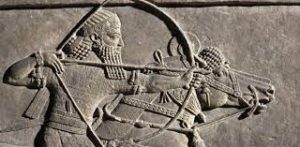The Judgment of Assyria
10: 5-34
The judgment of Assyria DIG: While 9:8 to 10:4 conveys God’s judgment against Isra’el, what is the focus of His judgment here? What was the LORD’s purpose in allowing Assyria to overrun the northern kingdom of Isra’el and the southern kingdom of Judah (see 10:5-6 and 7:17)?

At this point, the tone of Isaiah’s message changes drastically. Assyria continues to be a central figure (10:5, 12, 24, 11:11 and 16), but now the hunter becomes the hunted. While it is true that what we trust, in place of the LORD, will destroy us (7:1 to 8:22), it does not mean that the destroyer is victorious in the end. If we are saved and belong to Him (First Corinthians 15:3-4), no matter what happens to us, it is still God who is supreme because He has said: Never will I leave you; never will I forsake you. So we say with confidence, “ADONAI is my helper; I will not be afraid. What can man do to me (Hebrews 13:4b-6)? This is the theological issue that is emphasized in Chapters 7-12. Who do the people of Judah trust? Assyria or YHVH?
From 10:5 to 12:6 Isaiah again contrasts the Assyrian Empire to the Millennial Kingdom of Messiah. Even though Assyria’s aggression was used by God to punish His people for their rebellion (9:8 to 10:4), Assyria would also eventually be punished. This is another instance of the outworking of the Abrahamic Covenant, which says: I will bless those who bless you, and whoever curses you I will curse (Genesis 12:3a). This segment brings out the meaning of Isaiah’s first son’s name Shear-Jashub, meaning a remnant will return.
One of the great issues in the evangelical Church is the security of the believer, meaning the absolute unfailing and permanent possession of eternal life guaranteed to the true believer by God Himself (see the commentary on The Life of Christ, to see link click Ms – The Eternal Security of the Believer). Jesus said it this way: My sheep hear My voice; I know them and they follow me. I give them eternal life, and they shall never perish; no one can snatch them out of My hand. My Father, who has given them to Me, is greater than all; no one can snatch them out of My Father’s hand. I and the Father are one (Yochanan 10:27-30). But all too often holy living is neglected because heaven is certain. By contrast, churches and messianic synagogues that have been more influenced by Arminius have tended to preach a kind of eternal insecurity, in which a believer’s eternal state depends on whether or not the most recent sin has been confessed; that you can be unsaved and need to be resaved. Their tendency is to focus on one’s behavior rather than on one’s relationship to God.
These issues seem to be the very ones underlying this passage. On the one hand, Isaiah is intent on assuring the people that the future of the nation is secure. Isra’el would survive. The Assyrians would not be able to destroy Judah. The people could live confidently. They did not need to surrender their trust in ADONAI in order to secure the outcome. Nevertheless, that confidence in the future was never meant to replace their relationship with the LORD. Just because Judah was secure, did not mean individual Israelites would not believe in Him. It is the same with us today. The Church will survive, but only those with a personal relationship with Jesus Christ will be saved with it.38



Leave A Comment